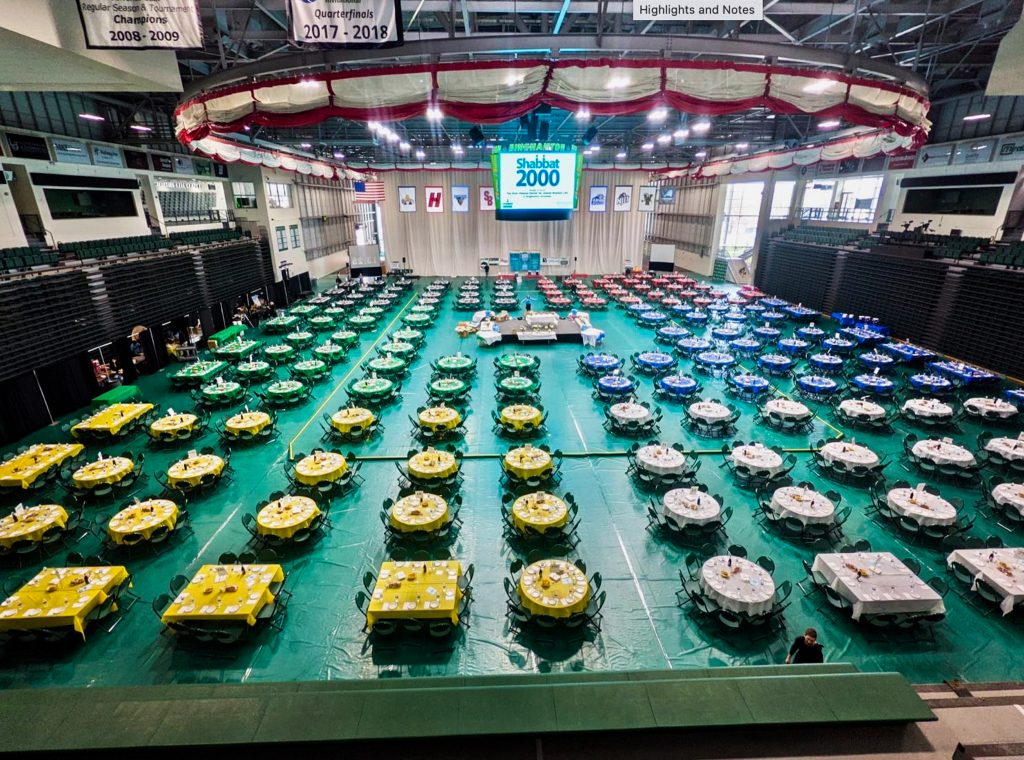The largest Shabbat dinner held on any college campus nationally is about to get even larger. Shabbat 2000, a campus-wide Shabbat dinner, will now become Shabbat 2400, as the attendee goal has reached a record high. Chabad at Binghamton will host their 30th-annual Shabbat 2000 — now Shabbat 2400 — April 5 at 6 p.m. in the Events Center.
This renowned Jewish event takes place at various other colleges across the country, but what makes it particularly special for Binghamton students is its Binghamton University origin. Shabbat 2400 has grown exponentially over the years with each year surpassing the last, making for a much anticipated event for the Jewish community.
Michal Levine, major programs coordinator of Chabad at BU and a junior majoring in Judaic studies, conveyed the event’s significance as well as its impact throughout the larger Binghamton community.
“Shabbat 2400 started 30 years ago in 1994 here in Binghamton as Shabbat 1000 and has now expanded into a worldwide event replicated on many other college campuses,” Levine wrote in an email. “It’s amazing to see how the Jewish community of Binghamton has grown and been able to make such an impact on the larger community as a whole. The inspiration behind having such a large Shabbat dinner is to come together as a community, both Jewish and non-Jewish students, eat a meal and grow an appreciation for each other and our different backgrounds and traditions.”
Beyond reaching new heights when it comes to the number of attendees, Nora Monasheri, secretary of the Chabad at Binghamton and a first-year graduate student studying business administration, delved into why this year’s Shabbat 2400 is especially important for the Jewish community.
“Every year, we look to make it bigger and better than the year before,” Monasheri wrote in an email. “Since Oct. 7, the events of the massacre ignited a level of Jewish solidarity like never before. This year, more than ever, Jewish unity is stronger and needed. I hope students get to see that they have a community of students there for them, whenever and wherever.”
Shabbat 2400 welcomes students from all types of faiths and backgrounds, encouraging a holistic and inclusive celebration of such a prevalent Jewish tradition. Avi Gordon, a Shabbat 2400 spearhead and a freshman majoring in business administration, further explained the cultural outreach of Shabbat 2400.
“Shabbat 2400 brings lots of attention and shows the outside world that the Jewish community stands strong and proud, not afraid to gather and practice our religion with both old and new friends,” Gordon wrote in an email. “It is an opportunity to give the rest of the world a view into Jewish culture and to show them how full of light, dancing and joy it is.”
Beginning at sunset every Friday — the seventh day of the Jewish week — and ending the following sundown, Shabbat is the Jewish day of rest where no work is to be done by those observing. The day involves customs to varying degrees, all of which contribute to Shabbat’s restful purpose and an overarching celebration of Judaism. Levine described one of the more traditional components of Shabbat, which is a practice having to do with abstaining from electronic usage.
“Shabbat is rich with Jewish tradition and what’s so unique about it is that everyone has their own way of celebrating it,” Levine wrote. “Traditionally, one takes a step back from the world and turns off their phones for the 25 hour period and spends their time at prayer services, eating meals and spending quality time with friends and family.”
Haley Wilenzick, a Shabbat 2400 spearhead and a sophomore majoring in integrative neuroscience, hinted at some more Shabbat traditions that students can anticipate for this year’s big event.
“Traditional Jewish foods like Challah and Matzo ball soup are central to the Shabbat dinner experience — students can try these foods and other traditional foods at the event,” Wilenzick wrote in an email. “Shabbat practices like lighting candles and singing specific prayers will also play a part … The experience will highlight Jewish foods, traditions and customs, encouraging meaningful interactions and community bonding.”
With the big day less than a month away, members of Chabad and the greater Jewish community are gearing up to make Shabbat 2400 the largest, most festive Shabbat to date.
Hannah Kirsch, a Shabbat 2400 spearhead and a senior majoring in psychology, shared what Shabbat means to her as well as what she hopes students take away from attending Shabbat 2400.
“I hope more people walk away with an understanding of what Shabbat is and why it is so important and loved in Jewish tradition,” Kirsch wrote in an email. “To me, Shabbat 2400 is a way to show students more about Shabbat, which is my favorite day of the week. It adds an element of spirituality to my life that I am so grateful for, and I hope all attendees, Jewish or not, can appreciate that and learn more about Judaism through that lens.”
Editor’s Note (3/22/24): This article has been edited to correct that the first Shabbat was called Shabbat 1000.



